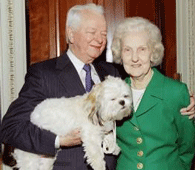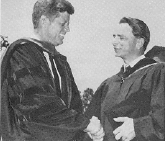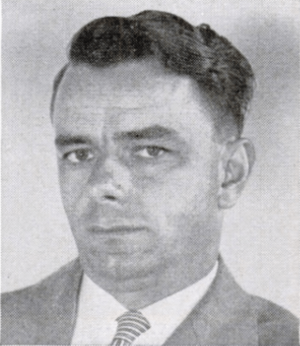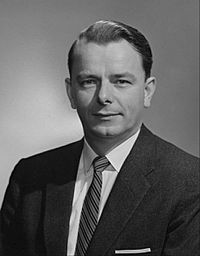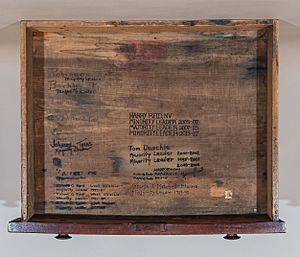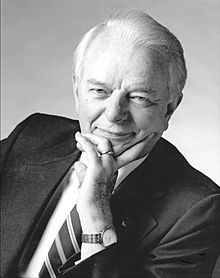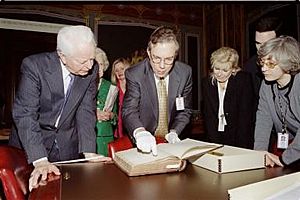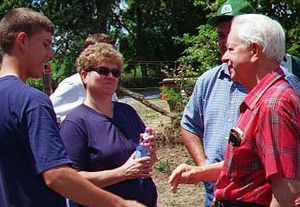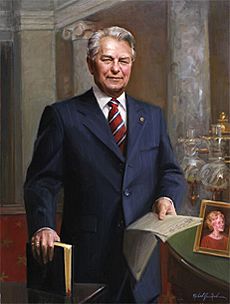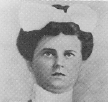Robert Byrd facts for kids
Quick facts for kids
Robert Byrd
|
|
|---|---|
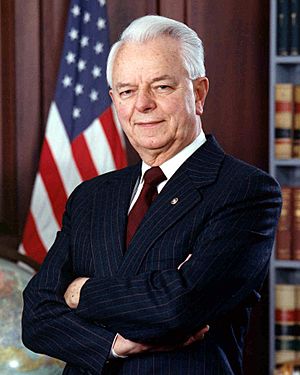
Official portrait, 2003
|
|
| Senate Majority Leader | |
| In office January 3, 1987 – January 3, 1989 |
|
| Deputy | Alan Cranston |
| Preceded by | Bob Dole |
| Succeeded by | George Mitchell |
| In office January 3, 1977 – January 3, 1981 |
|
| Deputy | Alan Cranston |
| Preceded by | Mike Mansfield |
| Succeeded by | Howard Baker |
| Senate Minority Leader | |
| In office January 3, 1981 – January 3, 1987 |
|
| Deputy | Alan Cranston |
| Preceded by | Howard Baker |
| Succeeded by | Bob Dole |
| Chair of the Senate Democratic Caucus | |
| In office January 3, 1977 – January 3, 1989 |
|
| Preceded by | Mike Mansfield |
| Succeeded by | George J. Mitchell |
| President pro tempore of the United States Senate | |
| In office January 3, 2007 – June 28, 2010 |
|
| Preceded by | Ted Stevens |
| Succeeded by | Daniel Inouye |
| In office June 6, 2001 – January 3, 2003 |
|
| Preceded by | Strom Thurmond |
| Succeeded by | Ted Stevens |
| In office January 3, 2001 – January 20, 2001 |
|
| Preceded by | Strom Thurmond |
| Succeeded by | Strom Thurmond |
| In office January 3, 1989 – January 3, 1995 |
|
| Preceded by | John C. Stennis |
| Succeeded by | Strom Thurmond |
| President pro tempore emeritus of the United States Senate | |
| In office January 3, 2003 – January 3, 2007 |
|
| Preceded by | Strom Thurmond |
| Succeeded by | Ted Stevens |
| United States Senator from West Virginia |
|
| In office January 3, 1959 – June 28, 2010 |
|
| Preceded by | Chapman Revercomb |
| Succeeded by | Carte Goodwin |
| Senate Majority Whip | |
| In office January 3, 1971 – January 3, 1977 |
|
| Leader | Mike Mansfield |
| Preceded by | Ted Kennedy |
| Succeeded by | Alan Cranston |
| Secretary of Senate Democratic Conference | |
| In office January 3, 1967 – January 3, 1971 |
|
| Leader | Mike Mansfield |
| Preceded by | George Smathers |
| Succeeded by | Ted Moss |
| Member of the U.S. House of Representatives from West Virginia's 6th district |
|
| In office January 3, 1953 – January 3, 1959 |
|
| Preceded by | Erland Hedrick |
| Succeeded by | John Slack |
| Member of the West Virginia Senate from the 9th district |
|
| In office December 1, 1950 – December 23, 1952 |
|
| Preceded by | Eugene Scott |
| Succeeded by | Jack Nuckols |
| Member of the West Virginia House of Delegates from Raleigh County |
|
| In office January 1947 – December 1950 |
|
| Preceded by | Multi-member district |
| Succeeded by | Multi-member district |
| Personal details | |
| Born |
Cornelius Calvin Sale Jr.
November 20, 1917 North Wilkesboro, North Carolina, U.S. |
| Died | June 28, 2010 (aged 92) Merrifield, Virginia, U.S. |
| Resting place | Columbia Gardens Cemetery Arlington County, Virginia, U.S. |
| Political party | Democratic |
| Spouse |
Erma James
(m. 1936; died 2006) |
| Children | 2 |
| Education | Marshall University (BA) American University (JD) |
| Signature | |
Robert Carlyle Byrd (born Cornelius Calvin Sale Jr.; November 20, 1917 – June 28, 2010) was an American politician and musician. He served as a U.S. Senator for West Virginia for over 51 years. This was from 1959 until his death in 2010. He was a member of the Democratic Party.
Before becoming a senator, Byrd was a U.S. Representative for six years (1953–1959). He holds the record as the longest-serving U.S. Senator ever. He was also the longest-serving member in the history of the United States Congress until 2013. Robert Byrd is the only person from West Virginia to serve in both parts of the state legislature and both parts of Congress.
Byrd's political career lasted more than 60 years. He started in politics by leading a local group in the 1940s. He later called this "the greatest mistake I ever made." He served in the West Virginia House of Delegates (1947–1950) and the West Virginia State Senate (1950–1952). He was elected to the United States House of Representatives in 1952. After six years there, he was elected to the Senate in 1958.
In the Senate, Byrd became very powerful. He was the secretary of the Senate Democratic Caucus (1967–1971). Then, he became Senate Majority Whip (1971–1977). For the next 12 years, he led the Democratic group as Senate Majority Leader and Senate Minority Leader. As the longest-serving Democratic senator, Byrd was the President pro tempore four times when his party was in charge. This role placed him third in line to become president.
Byrd used his position as chairman of the United States Senate Committee on Appropriations to bring a lot of federal money to West Virginia. This helped fund projects like highways and schools. He strongly opposed the Iraq War. Byrd was known for his deep knowledge of Senate rules and history. He wrote a four-volume history of the Senate. He died in office on June 28, 2010, at age 92. He is buried in Columbia Gardens Cemetery in Arlington County, Virginia.
Contents
Early Life and Education
Robert Byrd was born on November 20, 1917. His birth name was Cornelius Calvin Sale Jr. He was born in North Wilkesboro, North Carolina. His mother, Ada Mae Kirby, died when he was ten months old. This happened during the 1918 flu pandemic. His father placed the children with relatives. Calvin Jr. was adopted by his aunt and uncle, Vlurma and Titus Byrd. They changed his name to Robert Carlyle Byrd. They raised him in the coal mining area of southern West Virginia. He grew up mainly in the town of Stotesbury, West Virginia.
Byrd went to public schools in Stotesbury. He played the violin in the Mark Twain School orchestra. He also played the bass drum in the high school marching band. He was the best student in his 1934 graduating class.
Family Life
On May 29, 1936, Byrd married Erma Ora James. She was born in Floyd County, Virginia, to a coal mining family. They met in high school in Raleigh County, West Virginia. Erma passed away on March 25, 2006.
Robert Byrd had two daughters, Mona and Marjorie. He also had six grandchildren and seven great-grandchildren.
A Past Mistake
When he was a young man in the early 1940s, Robert Byrd helped start a local chapter of the Ku Klux Klan. He later said this was "the greatest mistake I ever made." He joined because he felt it offered excitement and was against communism. He also said his involvement reflected the "fears and prejudices" of that time.
Byrd later apologized many times for joining the KKK. In 1997, he advised young people to avoid getting that "albatross around your neck." He explained that he had a "narrow and immature outlook" and thought the group could help his ambitions. In 2005, he said, "I know now I was wrong. Intolerance had no place in America. I apologized a thousand times ... and I don't mind apologizing over and over again."
Starting His Career
Byrd worked many jobs before politics. He was a gas station attendant, a grocery store clerk, and a welder during World War II. He also worked as a butcher. In 1946, he won a seat in the West Virginia House of Delegates. He represented Raleigh County from 1947 to 1950. He became known locally after a radio station in Beckley broadcast his "fiery fundamentalist lessons." In 1950, he was elected to the West Virginia Senate. He served there from December 1950 to December 1952.
Continuing His Education
Byrd continued his education throughout his career. He attended several colleges, including Beckley College and Marshall College. In 1953, he started night classes at American University Washington College of Law. He earned his law degree ten years later, while he was a U.S. Senator. President John F. Kennedy spoke at his graduation ceremony in 1963.
Later, Byrd decided to earn his Bachelor of Arts degree in political science. In 1994, he graduated with high honors from Marshall University.
Serving in Congress
In 1952, Byrd was elected to the United States House of Representatives. He represented West Virginia's 6th congressional district. He served there for six years, from January 3, 1953, to January 3, 1959. In 1958, Byrd defeated W. Chapman Revercomb to win a seat in the United States Senate. He was re-elected to the Senate eight times. He served as West Virginia's junior senator for his first four terms.
Byrd was very popular in West Virginia. He ran unopposed only once, in 1976. In three other elections (1970, 1994, and 2000), he won all 55 counties in West Virginia. In 2000, he won all but seven voting areas.
Longest-Serving Senator
Byrd was elected to a record ninth full Senate term in 2006. On June 12, 2006, he became the longest-serving senator in American history. He passed Strom Thurmond with 17,327 days of service. On November 18, 2009, Byrd became the longest-serving member in all of Congress. He had 56 years and 320 days of combined service in the House and Senate. He is the only senator to serve more than 50 years.
Byrd never lost an election. He cast his 18,000th vote on June 21, 2007, which is the most of any senator.
Important Senate Roles
Byrd held many important leadership positions in the Senate. He was the secretary of the Senate Democratic Conference from 1967 to 1971. He then became Majority Whip from 1971 to 1977. This was the second-highest position for Democrats.
From 1977 to 1989, Byrd led the Senate Democrats. He served as Majority Leader from 1977 to 1981 and again from 1987 to 1989. He was also Minority Leader from 1981 to 1987.
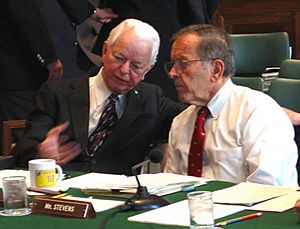
As the longest-serving Democratic senator, Byrd served as President pro tempore four times. This role is given to the longest-serving senator of the majority party. It places them third in the line of presidential succession.
Bringing Funds to West Virginia
Byrd was famous for bringing federal money to West Virginia. This is one of the country's poorer states. He was sometimes called the "King of Pork" by critics. After becoming chairman of the Appropriations Committee in 1989, he aimed to get $1 billion for public projects in his state. He reached this goal in 1991. Funds for highways, dams, schools, and federal offices continued to flow to West Virginia. More than 30 federal projects in the state are named after him.
Understanding Senate Rules
Byrd was also known for his deep understanding of parliamentary procedure. He knew the Senate's rules very well. This helped him guide legislation and sometimes outsmart opponents. In 1988, he even used a rule to make sure enough senators were present for a vote.
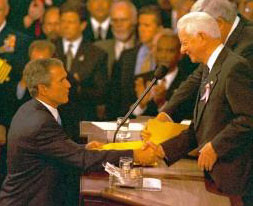
Scholarships and History Grants
In 1969, Byrd started a Scholastic Recognition Award. He gave savings bonds to top high school students in West Virginia. In 1985, Congress approved a national scholarship program. It was later named the Robert C. Byrd Honors Scholarship Program. It gave money to students with "outstanding academic achievement" who were going to college.
In 2002, Byrd helped create a national program to improve the teaching of "traditional American history" in schools. This program gave money to school districts for teacher training.
Senate Historian
Byrd helped bring television cameras to the Senate in 1986. He wanted the public to see how the Senate worked. He also gave a series of 100 speeches about the history of the Roman Republic and the U.S. Constitution.
Byrd published a four-volume series called The Senate: 1789–1989: Addresses on the History of the Senate. He also wrote The Senate of the Roman Republic: Addresses on the History of Roman Constitutionalism. He received awards for his contributions to history.
Later Senate Years
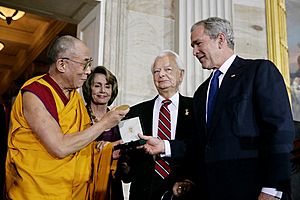
On July 19, 2007, Byrd gave a speech against dog fighting in the Senate. This was in response to a famous case involving a football player.
In May 2008, Byrd supported then-Senator Barack Obama for president. He called Obama "a noble-hearted patriot and humble Christian."
Despite his poor health, Byrd was present for important votes in December 2009. He voted on the healthcare debate. His vote was needed to stop a Republican filibuster. When casting his final vote on December 24, 2009, he said, "Mr. President, this is for my friend Ted Kennedy! Aye!"
Political Views and Changes
Byrd's views on race changed a lot during his life. Early in his career, he voted against some civil rights laws. However, he later hired one of the first Black congressional aides. He also helped integrate the United States Capitol Police.
Starting in the 1970s, Byrd openly said he was wrong about his earlier views. He regretted voting against the Civil Rights Act of 1964. He said his views changed after his grandson died in 1982. This made him realize that African Americans love their children as much as he loved his.
In 2005, Byrd proposed adding $10 million in federal money for the Martin Luther King Jr. Memorial. He said, "With the passage of time, we have come to learn that his Dream was the American Dream." When he died, the National Association for the Advancement of Colored People (NAACP) praised him. They said he "became a champion for civil rights and liberties."
Iraq War Opposition
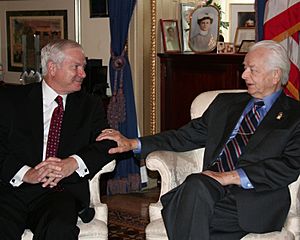
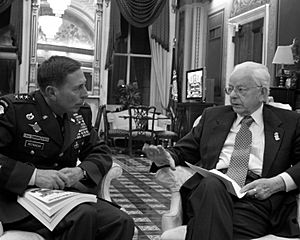
Byrd was one of the strongest critics of the 2003 invasion of Iraq. He tried to stop the bill that gave President George W. Bush power to start a war. He could not get enough votes to stop it.
Byrd also criticized President Bush's speech declaring the "end of major combat operations" in Iraq. On October 17, 2003, Byrd gave a speech comparing President Bush to the emperor in "The Emperor's New Clothes". He said, "the emperor has no clothes." He urged other senators to oppose a "war based on falsehoods."
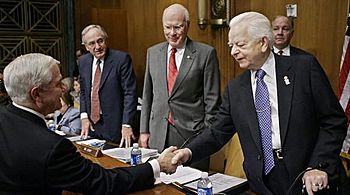
Of the more than 18,000 votes he cast, Byrd said he was most proud of his vote against the Iraq war resolution.
Health and Passing
Byrd had a medical condition that caused shaking. He eventually used a wheelchair to move around. His health got worse in his later years. He was hospitalized several times.
On January 20, 2009, Senator Ted Kennedy had a seizure during Barack Obama's inauguration lunch. Byrd, who was at the same table, became upset and was taken to his office. His office later said he was fine. In May 2009, Byrd was hospitalized for a "minor infection" and a staph infection. He was released in June 2009.
Byrd's last hospital stay began on June 27, 2010. He died the next day, June 28, 2010, at age 92. He passed away from natural causes.
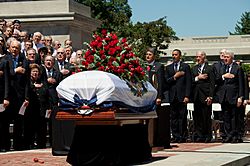
Many political figures shared their thoughts after Byrd's death. President Barack Obama said Byrd "held the deepest respect of members of both parties." Vice President Joe Biden called him "a tough, compassionate, and outspoken leader." Former President Bill Clinton said Byrd "shaped history."
On July 1, 2010, Byrd's body lay in honor in the Senate chamber of the United States Capitol. He was the first senator to do so since 1957. Then, he was flown to Charleston, West Virginia. His body lay in honor in the State Capitol there.
A funeral was held on July 2, 2010, at the State Capitol. President Obama, Vice President Biden, and former President Clinton spoke. After the services, Byrd was buried next to his wife Erma at Columbia Gardens Cemetery in Arlington. The song "Take Me Home, Country Roads" was played as his casket was carried into the West Virginia State Capitol Building.
Published Books
- 1989. The Senate, 1789–1989, Vol. 1: Addresses on the History of the United States Senate.
- 1991. The Senate, 1789–1989, Vol. 2: Addresses on the History of the United States Senate.
- 1993. The Senate, 1789–1989: Historical Statistics, 1789–1992, Vol. 4.
- 1995. The Senate, 1789–1989: Classic Speeches, 1830–1993, Vol. 3.
- 1995. Senate of the Roman Republic: Addresses on the History of Roman Constitutionalism.
- 2004. Losing America: Confronting A Reckless and Arrogant Presidency.
- 2004. We Stand Passively Mute: Senator Robert C. Byrd's Iraq Speeches.
- 2005. Robert C. Byrd: Child of the Appalachian Coalfields.
- 2008. Letter to a New President: Commonsense Lessons for Our Next Leader.
Robert C. Byrd Center for Legislative Studies
In 2002, the Robert C. Byrd Center for Legislative Studies (CLS) opened at Shepherd University. This center helps people better understand the United States Congress and the Constitution. It holds Senator Robert C. Byrd's papers and other historical documents. The CLS is a place for research and learning about how laws are made.
Images for kids
See also
 In Spanish: Robert Byrd para niños
In Spanish: Robert Byrd para niños
- Byrd Rule
- List of places named after Robert Byrd
- List of members of the United States Congress by longevity of service
- List of United States Congress members who died in office
 | William Lucy |
 | Charles Hayes |
 | Cleveland Robinson |


